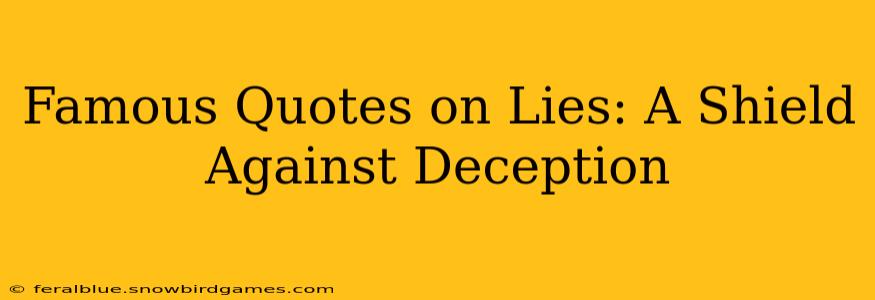Lying. It's a universal human experience, woven into the fabric of our history and stories. From the smallest white lie to the grandest deception, the act of untruth has captivated thinkers and writers for centuries. Examining famous quotes on lies allows us to delve deeper into the nature of deception, its consequences, and the importance of truth. This exploration provides not only a fascinating glimpse into the minds of great thinkers but also equips us with a sharper understanding of how to navigate a world often shrouded in falsehoods.
What are some famous quotes about lies?
Many insightful minds have reflected on the destructive power of lies. Let's explore some of the most impactful quotes on this pervasive human behavior, categorized for clarity:
Quotes Highlighting the Damage of Lies:
-
"A lie is like a snowball: the more it rolls, the bigger it gets." This anonymous quote powerfully illustrates the cascading effect of deception. One lie often necessitates further lies to maintain the facade, leading to an ever-growing web of deceit that's increasingly difficult to manage. The snowball analogy effectively communicates the exponential nature of the problem.
-
"The truth will set you free. But first, it will piss you off." —Gloria Steinem. This quote acknowledges the often uncomfortable but ultimately liberating nature of truth. Discovering the truth, particularly when it involves deception, can be jarring and upsetting, but it's a necessary step towards personal growth and freedom from the weight of falsehoods.
-
"It is better to offer no excuse than a bad one." —George Washington. This quote emphasizes the importance of honesty, even in difficult situations. Attempting to justify a lie often leads to further deception and a greater loss of trust. Honesty, even when it's difficult, is always the best policy.
Quotes on the Nature and Detection of Lies:
-
"It is not enough to be honest; one must also be wise." —John Galsworthy. This quote underscores the importance of not only telling the truth but also being discerning about who you share it with and how you convey it. Sometimes, honesty without wisdom can be misinterpreted or even cause harm.
-
"What is truth? Said jesting Pilate, and would not stay for an answer." —Francis Bacon. This quote, referencing Pontius Pilate's question, highlights the elusive and often subjective nature of truth. Determining the truth, especially in complex situations, can be challenging and requires careful consideration and critical analysis.
-
"There are lies, damn lies, and statistics." —Mark Twain (attributed). This famous (though the attribution is debated) quote highlights how data, when manipulated or misrepresented, can be used to deceive with an air of authority. It serves as a cautionary tale to be critical of statistics and other quantitative information presented as fact.
Quotes Focusing on the Consequences of Lies:
-
"A lie can travel halfway around the world while the truth is still putting on its shoes." —Mark Twain (attributed). This powerfully illustrates how easily lies spread and gain traction, while the truth, often requiring evidence and verification, can struggle to catch up. This speaks to the urgency of addressing misinformation and the challenges in combating the rapid spread of false narratives.
-
"When you have told a lie, you have to invent ten more to cover it up." —Anonymous. This quote illustrates the insidious nature of deception. Each lie creates a need for further deception to maintain the original falsehood, leading to a complicated and unsustainable web of untruths.
-
"The only true wisdom is in knowing you know nothing." —Socrates. While not explicitly about lying, this quote highlights the importance of humility and critical thinking in navigating a world often filled with misinformation. Acknowledging the limits of one's knowledge encourages intellectual honesty and helps in discerning truth from falsehood.
Why are quotes on lies so important?
These quotes offer invaluable insights into the complex nature of lying and its pervasive impact on individuals and society. They serve as a constant reminder of the importance of honesty, integrity, and critical thinking in navigating a world often filled with deception. By reflecting on these timeless words, we can sharpen our ability to identify and counter falsehoods, ultimately safeguarding ourselves and contributing to a more truthful and transparent world. Understanding the subtle nuances of deception, as illuminated by these quotes, is a vital life skill in the age of misinformation.

